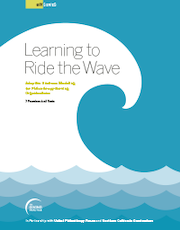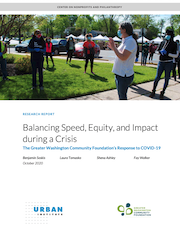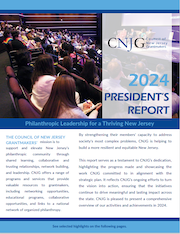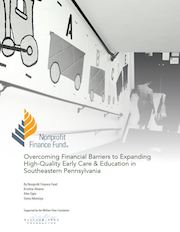Site Search
- resource provided by the Forum Network Knowledgebase.
Search Tip: Search with " " to find exact matches.
This weekly conference call series welcomed New Jersey-based grantmakers along with national funders and provided an opportunity for grantmakers to hear from a wide range of experts in the field of disaster philanthropy. This series started on November 5, 2012, one week after Sandy struck New Jersey, and continued through March 25, 2013. The written summaries of each recording are listed below.
How can being more transparent about your philanthropy strengthen your relationships and build trust with grantees and partners?
The annual Trust in Nonprofits and Philanthropy Report showed that 57 percent of Americans trust the nonprofit sector—much higher than the government, media, or the business sector. Yet, only 33 percent have trust in the philanthropic sector (primarily private foundations and high net-worth individuals). Why is this and how can family philanthropy increase this trust?
By prioritizing transparency, families can grow trusting relationships with the communities and organizations that they support, be more accountable donors, and ultimately enhance the effectiveness of their philanthropic efforts.
Cost: This event is free for CNJG Members who are family foundations.
Other types of foundations are ineligible to join this webinar.
This program is a CNJG membership benefit for family foundation members, including staff and trustees, in partnership with the National Center for Family Philanthropy.

Developed in partnership with United Philanthropy Forum and Northern California Grantmakers, this guide shares seven practices and 12 tools for Philanthropy-Serving Organizations who seek effective ways to mobilize resources to sustain their organization’s work. The guide features perspectives from dozens of leaders of national and regional PSOs and examples from our work with these organizations. Much of the content is based on conversations and strategy work with PSO leaders, staff and board members.

The COVID-19 public health and economic crisis has changed our world as we know it. As employers moved to remote work, schools shifted to distance learning, and businesses closed completely, it became clear that the impact on residents, nonprofits, and businesses was far greater than anyone could have ever imagined.
In response to the growing and evolving needs of our region, the Greater Washington Community Foundation established the COVID-19 Emergency Response Fund to raise and rapidly deploy funding to local nonprofits providing food, shelter, educational supports, and other critical services.
From the beginning our goal was clear: to address the immediate needs and reach adversely affected communities, particularly low-income households and communities of color. We know all too well that in a crisis like this, these marginalized communities are hit the hardest, and often take the longest to recover.
In times of crises, The Community Foundation is our region’s philanthropic first responder, bringing together individuals and families, philanthropic peers, corporate partners, and local government advisors to address community issues. Building on our rich history of emergency response work, we grounded our COVID-19 response efforts in a similar coordinated approach.
This report chronicles the steps taken, under immense pressure, to develop a coordinated emergency response effort to support a broad range of needs across the region. Once again this effort has demonstrated that working in partnership and close collaboration with our philanthropic peers and local government advisors is an effective way to manage a response to both urgent and longer-term needs.

CNJG's President's Reports
Newark Mayor Ras Baraka on Tuesday announced the recipients of the 2022 Creative Catalyst Fund awards. A total of 114 grants will be awarded to individual artists and artists’ collectives, with an average award of $3,200; and 34 grants will be awarded to small and midsized arts organizations with an average award of $10,100.
Baraka created the fund in January 2020 as a multiyear initiative providing the local community of artists and small and midsized arts organizations up to $1 million annually for at least three years. The fund has awarded a total of $2.35 million in grants in its first three years. Grantees use the funds to help pay for operating costs, space rentals, staff, programming costs, supplies and equipment, and COVID-related expenses.
“Newark has a long history as a center of the arts, and our administration has supported the arts in word and deed, creating great works like the second-longest public mural on the East Coast. We are proud, privileged and humbled to write a new chapter by supporting this year’s grantees. Their works will define the voice and talent of a new generation of Newark artists for our present and future,” Baraka said.
Capacity building enables nonprofit leaders and organizations to develop the skills and resources they need to improve their work. Since each situation is unique and circumstances are always changing, effective capacity-building support is tailored to best suit the needs of grantees. This publication offers practical guidance and considerations to help grantmakers design an impactful approach.

This advocacy and civic engagement toolkit is designed for community and public foundations that want to educate and encourage their grantees about getting involved in civic and policy activities to increase organizational capacity and impact. While its primary focus is on the grantmaking activity of these foundations, the toolkit also addresses rules and guidance for policy involvement by foundation officials acting on behalf of their foundations.
A CNJG member queried our listserves for sample questions (not included in the grant application) you might ask grantees or potential grantees during site visits. CNJG compiled these responses, and other documents members use.
